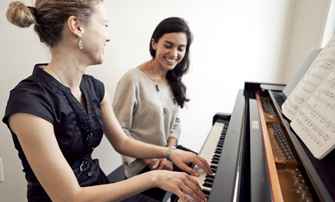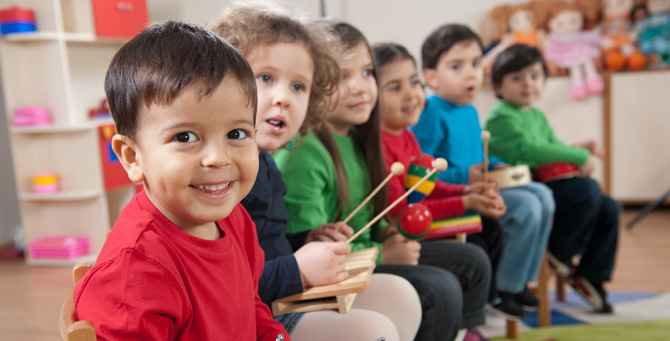Am I too old to learn music?

You're Never Too Old To Learn Music
No, you aren’t too old to play music. It’s an old myth. As an adult you even have many advantages over children in learning to play music.
Since founding Sage Music School, we have always had more adults at our school than children. And that’s because we welcome everyone who wants to do music well. The result has been that about 61% of our students are adults just like you. They are taking guitar, piano, voice, violin, saxophone, clarinet, flute, drum, cello, trumpet and horn lessons.
Our adults music students have many diverse reasons for taking music lessons. Here are just a few:
- Staying mentally active
- Having a diversion from work or school
- Something challenging to do during retirement or outside of work
- An activity to do with partners or friends
- Preventing Alzheimer’s or Dementia
- A love of music they want to pursue
And many, many more.
There are very few reasons to prevent you from starting music lessons as an adult. Whether that is starting for the first time, or starting again if you stopped when you were younger. Something like arthritis might make it harder to learn music, but we do have several older musicians at our school who continue to play and learn music anyway.
To the contrary, there may be many reasons to pursue music as an adult, such as increased happiness, and improved relationships with your partner, as research suggests.
Myth: Children learn music better than adults.

You may have heard that you should start music very young. In my opinion, this is just something that many schools will say to try to get children to start music sooner rather than later. While it is true that children have some advantages, these generally apply to extremely young children who are under the age of 6. These children are often too young to learn music anyway. By the time they are old enough to play music. Their inherent advantages have all but disappeared.
In fact, this review of all adult music education research from 1957 to 1993 found that older adults have no decreases in the ability to do music based on the Musical Aptitude Profile test. Perhaps this is why more and more adults are taking up music for the first time.
Why don't children have the advantage in learning music?

There are generally two types of learning: experience expectant and experience dependent learning.
Experience expectant learning – how very young children learn
Experience expectant just means your brain has a bunch of extra neurons because it expects you will use them.
Babies brains have extra neurons set up and ready to be used for language, because they expect to learn to speak. They have others for sight because they expect to see. These are normal expected human functions.
Expected learning has a use it or lose it rule. For example, if children are not exposed to sights and sounds by an early age, they actually do not develop the ability to see or hear normally. Basically, the brain decides all those extra neurons are not going to be used and removes those neurons in a process called neural pruning. This happens largely before the age of 6.
When people say that children learn better, they are referring to this type of expected learning which must be developed when a child is very young.
But most children who take music lessons start between the ages of 7 and 12. This is after most of the neural pruning happens. This means that they are learning just like adults by growing new connections. So the vast majority of children who start music lessons don’t have the advantage of expectant learning. This means that you can learn just as well as those kids!
What’s more is that playing a musical instrument is not an expected function. Babies are not born expecting that they will play music. So they don’t have any extra neurons for it anyway. So it doesn’t really make a difference.
So the argument that children will learn better than adults, for the most part, does not apply to playing a musical instrument.
Playing music is an experience dependent learning.
Experience dependent learning: how adults learn

Experience dependent learning is all learning that the brain is not expecting to learn. It means that when you have new experiences, your brain rewires itself to learn something new. The learning depends upon the experience. Expectant learning has sensitive and critical periods when things must be learned, or else you can’t learn them later. There is no such critical time for dependent learning.
Playing music falls into this category. So whether or not you are an adult or a child, you have to grow new neural connections to learn music. Just like you can learn to drive a car at 16, 30, or 60, you can learn music. Both are learned and depend upon having new experiences.
Be patient and trust in the process, and you can do it. In fact, contrary to the general opinion, I believe that you can learn music BETTER than children.
The advantages of learning music as an adult
There are many advantages that you have over children in learning music. (See this article about the advantages of adult music learning.) Let’s now talk about how you can do better. Afnd keep score. Why not? Game on!
Kids 0
Adults 0
Strength is required to play a musical instrument
Every musical instrument is a machine. And they all take physical effort to play. Most adults have stronger bodies than young children. And so it will feel like it takes less physical effort for an adult to play a musical instrument than a child.
Kids 0
Adults 1
Musical Instruments are built for adults
While we are all slightly different sizes and shapes, musical instruments are built mostly adult size. They were made to fit into your hands. They were not made to fit into a child’s hands.
Kids 0
Adults 2
Adults have a fully developed sense of time
Parents will often encourage kids to practice by saying “don’t you want to get better someday?” And it never works. Why? Children under the age of 18 have not fully developed their sense of time. This means that they cannot connect their present actions (like practicing) with their future self (learning music).
But you as an adult know that what you do today affects your future. This means you will be a much better practicer and achieve more consistent practice.
Kids 0
Adults 3
You are more disciplined
As you get older, your sense of discipline improves. This means that you can practice more diligently than a child. And since you learn just like children do, though experience, you can be more consistent and getter better outcomes. Kids require their parents to be disciplined for them, and get them to practice.
Systems and consistent practice are what will drive your musical success. This is why we have developed a complete system for teaching music lessons which we call ARPEGGIO®.
Kids 0
Adults 4
Children are to be seen and not to be heard
Okay, this one is a joke. But if kids are not to be heard, they definitely are not playing music. Add one more to team adult.
Kids 0
Adults 5
Is there any advantage to being young when you play music?
Yes. Time is on their side. Learning music, if you are practicing it consistently, is just a product of how many hours you do of quality practice.
Children have more hours of their life left. And thus they have greater potential to learn things over the course of a lifetime.
So if you want to be a professional musician, it is better to start earlier. But if you look at the reasons that adults want to take lessons with us, most are not related to a career in music. And all of the above listed goals can be achieved in a relatively short period of time.
Kids 1
Adults 5
Conclusion – Adults Rock
No matter how you look at the issues, adults are generally better suited to learn music than children. Adults have better concentration, strength, discipline, and learn generally in the same way.
They only real advantage kids have is time, which is only vitally important when your ambition is to make a career of music. If that’s you, it’s still possible, but will just take more effort and better strategies.
Good luck in starting your musical journey!
Related



Sage